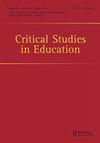政策事务:审查企业部门在促进教育改革方面的新兴战略
IF 2.7
2区 教育学
Q1 EDUCATION & EDUCATIONAL RESEARCH
引用次数: 25
摘要
摘要本文考察了企业部门在制定教育政策中扮演的角色越来越多样化。尽管越来越多的学者记录了企业部门在决策过程中的嵌入程度不断加深,但对企业行为者动员的战略的实证研究仍然是不系统和零碎的。此外,现有的企业政策影响战略分类往往仅限于有限的盎格鲁撒克逊国家,因此不适合捕捉全球新兴的政策动态。基于文献综述的结果,本文对企业部门提出的四种新兴战略进行了分类:知识动员、网络化、与基层接触和以身作则。每一项战略都用一些国家案例研究的例子加以说明。这些例子表明,在教育政策领域,企业部门不仅是政策影响者,而且越来越多地成为政策制定过程和空间中有机嵌入的政策行动者。本文章由计算机程序翻译,如有差异,请以英文原文为准。
The business of policy: a review of the corporate sector’s emerging strategies in the promotion of education reform
ABSTRACT This paper examines the increasingly diverse range of roles played by the corporate sector in shaping education policy. While a growing body of scholarship has documented the deepening embeddedness of the corporate sector within policy-making processes, empirical research on the strategies mobilized by corporate actors remains unsystematised and fragmentary. Furthermore, existing categorizations of corporate policy-influence strategies are frequently restricted to a limited group of Anglo-Saxon countries and, consequently, are ill suited to capturing emerging policy dynamics globally. Building on the results of a literature review, this paper categorises four emerging strategies articulated by the corporate sector: knowledge mobilization, networking, engaging with grassroots, and leading by example. Each strategy is illustrated with examples from a selection of country case studies. These examples suggest that, in the education policy domain, the corporate sector operates not only as a policy influencer, but increasingly as a policy actor organically embedded within policy-making processes and spaces.
求助全文
通过发布文献求助,成功后即可免费获取论文全文。
去求助
来源期刊

Critical Studies in Education
EDUCATION & EDUCATIONAL RESEARCH-
CiteScore
10.10
自引率
5.10%
发文量
18
期刊介绍:
Critical Studies in Education is one of the few international journals devoted to a critical sociology of education, although it welcomes submissions with a critical stance that draw on other disciplines (e.g. philosophy, social geography, history) in order to understand ''the social''. Two interests frame the journal’s critical approach to research: (1) who benefits (and who does not) from current and historical social arrangements in education and, (2) from the standpoint of the least advantaged, what can be done about inequitable arrangements. Informed by this approach, articles published in the journal draw on post-structural, feminist, postcolonial and other critical orientations to critique education systems and to identify alternatives for education policy, practice and research.
 求助内容:
求助内容: 应助结果提醒方式:
应助结果提醒方式:


